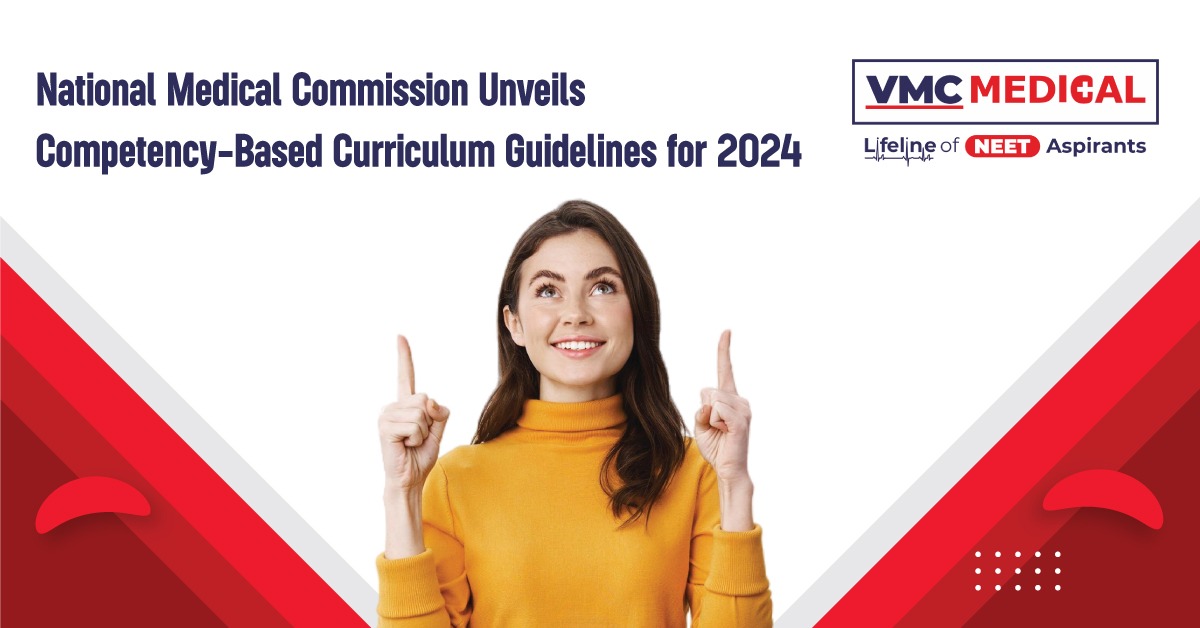Revolutionizing Medical Education: National Medical Commission Unveils Competency-Based Curriculum Guidelines 2024
 Posted On
Posted On
296 total views, 1 views today
In a move to significantly reform medical education in India, the National Medical Commission (NMC) has unveiled its Competency-Based Medical Education (CBME) Curriculum Guidelines for 2024. This latest revision aims to further enhance the quality of medical training in the country by building on the framework established by the Graduate Medical Education Regulations (GMER), first implemented in 1997 and later revised in 2023.
The 2024 guidelines are the result of extensive feedback collected over five years of CBME implementation, focusing on making the medical education system more adaptable to the ever-evolving healthcare landscape. These guidelines are structured to make education more learner-focused and patient-centered, aligning closely with global medical education standards. Furthermore, the new curriculum emphasizes subject integration through both horizontal and vertical learning, moving away from broad competencies to more specific subject-based skills that students need to master at each stage of their education.
Key Highlights of the Updated CBME Guidelines
1. Ethical and Communication Skills Development (AETCOM Program)
One of the standout features of the new curriculum is the introduction of the AETCOM program, which stands for Attitude, Ethics, and Communication. This longitudinal initiative is designed to instill ethical values and enhance communication skills, enabling future doctors to interact more effectively with patients, their families, and other healthcare professionals. The program will ensure that graduates are not only proficient in clinical knowledge but also capable of handling the emotional and ethical challenges that often arise in medical practice.
2. Holistic Medical Education
The revised curriculum strives to produce medical graduates equipped to offer preventive, promotive, curative, and rehabilitative care. It goes beyond clinical knowledge, aiming to develop professionals who can address emerging healthcare challenges and adapt to rapid scientific and technological advancements. The curriculum now mandates a stronger focus on a holistic understanding of healthcare, urging students to consider the larger context of community health and well-being.
3. National and Institutional Goals
The updated guidelines also outline national goals for Indian Medical Graduates (IMGs), aiming to cultivate doctors who can meet social responsibilities, understand public health policies, and approach problems with a scientific mindset. These goals also align with the need to develop professionals who are equipped to manage various health conditions effectively while working cohesively within healthcare teams.
Institutional goals are focused on ensuring that medical colleges produce competent and compassionate professionals who can tackle India’s diverse healthcare challenges. These professionals will not only possess technical skills but also demonstrate leadership, empathy, and the ability to work within a multidisciplinary team.
Core Features of the Revised Curriculum
1. Competency-Based Training
The CBME curriculum requires medical graduates to demonstrate a thorough understanding of human health, disease mechanisms, and ethical principles. Students must be adept at taking patient histories, conducting physical examinations, and solving clinical problems. The ultimate goal is to produce doctors who possess comprehensive medical knowledge and the critical thinking skills necessary for patient care in real-world settings.
2. Leadership and Teamwork
In addition to clinical competencies, the curriculum emphasizes the importance of teamwork and leadership in healthcare. Graduates are expected to work collaboratively with colleagues and lead efforts aimed at improving healthcare delivery and patient safety. Leadership skills will be developed alongside clinical training to ensure that future doctors can take on managerial roles and initiate improvements within healthcare systems.
3. Enhanced Communication Skills
Clear, compassionate communication is vital in medicine, and the new guidelines reinforce its importance. Doctors must be able to communicate effectively with patients and their families, providing them with accurate information and emotional support. Equally important is the ability to communicate and collaborate with fellow healthcare professionals to ensure that patients receive the best possible care.
Eligibility Criteria for Professional Examinations
To ensure students are adequately prepared for their professional roles, the NMC has introduced strict eligibility criteria for examinations. These guidelines outline attendance requirements and the significance of internal assessments in evaluating a student’s readiness to progress.
1. Attendance Requirements
- Theory Classes: Students must maintain at least 75% attendance in their theory classes.
- Practical/Clinical Sessions: A minimum of 80% attendance is required in practical and clinical sessions.
- Phased Subjects: For subjects taught over multiple phases, students must secure 75% attendance in theory and 80% in practicals for each phase. This ensures that students receive consistent exposure to both theoretical and hands-on learning throughout their medical education.
- AETCOM and Family Adoption Program: In addition to classroom learning, students are required to achieve 75% attendance in AETCOM sessions and 80% attendance in family visits as part of the Family Adoption Program. Each student must adopt at least three to five families to understand the dynamics of healthcare delivery at the community level.
- Clinical Postings: Students must obtain 75% attendance in all subjects and their related branches. In clinical postings, they must obtain 80% attendance. Failing to meet this requirement could result in students being ineligible for the Third Professional – Part II exam or NExT, the national exit test for medical graduates.
2. Internal Assessment (IA)
The internal assessment (IA) plays a crucial role in evaluating a student’s day-to-day performance. It covers various aspects, including assignments, clinical case presentations, seminar preparation, problem-solving tasks, and community health projects. These assessments ensure that students are consistently engaged with their learning and can apply their knowledge practically.
- Marks Distribution: Internal assessment marks are distributed across different phases and subjects. For example, in General Medicine, the internal assessment is divided across three phases, with different weightages assigned to specialties like Psychiatry and Dermatology.
- Format: Both subjective and objective evaluations form part of the IA, and these scores are reported separately from summative exams. They appear as a distinct column on the student’s marks card, providing a clearer picture of their academic performance.
Passing Criteria for Examinations
The passing criteria have been made more transparent to ensure students understand the requirements needed to advance in their medical education.
- Overall Passing Marks: To pass university-conducted examinations, students must achieve a cumulative score of 50% in both theory and practical exams.
- Sectional Requirements: A minimum of 40% is required in both the theory and practical sections, with students needing to secure at least 40% across multiple papers in subjects with two or more theory papers.
Closing Thoughts
Modernizing medical education in India is a big step forward with the NMC’s new CBME curriculum. It not only equips future doctors with the clinical and technical skills required but also nurtures ethical, compassionate professionals capable of leading healthcare improvements. With a focus on competency-based training, leadership, teamwork, and effective communication, the new guidelines will help produce well-rounded doctors who can meet the challenges of the healthcare sector both in India and globally. This comprehensive approach ensures that Indian medical graduates are well-prepared to contribute meaningfully to the nation’s health landscape while adhering to the highest ethical and professional standards.




